
By Moha Ennaji
With the escalation of violence in the Middle East and North Africa, and in the wake of the deplorable terrorism in Paris, Muslims all over the world reacted almost unanimously to condemn the odious attacks, describing them as opposing the teachings of Islam.
The heinous jihadists’ attacks are reminiscent of the history of the Catholic Church, which witnessed many religious wars (like the night of St Bartholomew massacre of 1572), and the killings triggered by French Catholics against Protestants, which marked the beginning of the 16th century religious wars.
They compel us strongly to argue that Islam must be reformed, and Muslims should take action to fight extremism and terrorism. For the vast majority of the Muslims the world over, this is a double penalty, as they feel soiled by terrorists who claim an Islam that is not theirs, but they have also become the target of those who hold them collectively responsible. The Muslim communities refuse amalgams between Islam and terror, while underlining the urgency of reforms within it.
Radical Islamism, which is characterised by moral conservatism, literalism, and the attempt to implement Islamic values in all spheres of life, even through violence, is established mainly in countries where there are weaknesses, political dysfunction, or absence of the state.
The violence experienced by France last January has somewhere a link with the violence that has rocked the Middle East and North Africa after the Arab Spring. It is clear that radical Islamism has found fertile ground in the African community in France, which is battered by unemployment and precariousness. In more recent years, radical Islamism has moved to Europe, partly because of its involvement in the global war against terrorism and partly because of lack of integration of its Muslims.
Moderate Muslim political leaders, imams (Muslim chaplains) and intellectuals have raised their voices to condemn terror. But they must undertake another fundamental task: address and reinterpret Islam’s stance on blasphemy, gender equity, freedom of expression, and other contemporary issues, and reach out to non-Muslims in order to know them better.
At present, the training of imams across the Muslim world and Europe is anything but unified. Integrated imams trained in Europe can promote Muslim integration, prevent violence, resolve contradictions between society and Muslims and further Islamic enlightenment. In Muslim countries, the existing institutions for imam training should be reformed, and new higher education institutions are necessary to train human rights-compliant imams. Due to their central role in the lives of Muslims, the training of imams and teachers of religion should be given an important role in the process of democratisation.
All Muslims must take responsibility and strongly speak in favour of the fundamental values of citizenship, secularism, freedom of expression, and equality between men and women. Like all other citizens, Muslims must abide by the fact that religious law does not in any way take precedence over civil law.
More generally, Islam should be modernised, as the Catholic Church did in the past. In a way, it has to do its “aggiornamento” as the Catholic Church did in the 19th century, and it must adapt to the 21st century context.Using ijtihad (a new interpretation of the Qur’an), Muslims must endeavour to adapt their religion to democracy, and they must finally admit that criticism of Islam is not an attack against them.
The Qur’an says “we created you as peoples and tribes so that you know each other” – that is the right reply. Not bloodshed. Not censorship.
This sort of teaching could also help the more intolerant Muslims understand the importance of promoting a sincere spirit of tolerance, and shows that rage and violence are a sign of naivety and immaturity. The strength of any faith stems not from its oppression of critics and dissidents, but from the integrity and the intellectual and innovative impact of its believers.
This can be implemented through education and multiculturalism with the purpose to promote intelligent debate and understanding on Islam and the role of Muslims in the contemporary world, and to prepare youth to contribute to both Muslim and multi-cultural environments. Schools must develop critical and analytical thinking in students, and provide them with an opportunity to develop the capacity for independent learning.
Islamist terrorism and extremism are nourished by extreme literal readings of the Qur’an and of the Islamic heritage idiosyncrasy, which are unfortunately supported in religious, educational, and informative programs throughout all Arab and Islamic countries. No Muslim government has dared to start a re-interpretation of religious discourse and to open the door for examination and reform which is consistent with the values of Islam and the culture of global human rights.
Arab-Muslim governments are encouraged to foster authentic and modern education reforms, and eliminate all dogmatic interpretations of the Qur’an and the Prophet’s sayings that incite violence and hatred.
To ensure that young people are not attracted by the most radical interpretations of the pillars of Islam, they must be educated following the principles of a moderate and modern Islam. The fight against radical Islamism and its influence must be on a daily basis: in the family, the neighbourhood, the mosque, schools, universities, associations, clubs, work places, prisons, etc.
Nothing will change until the Muslim world engages in a democratic transition, as seems to be the case in Turkey, Tunisia, and Morocco. Instead of supporting radical Islamists and dictators, Western democracies should uphold liberals, democrats, and progressive forces in the Middle East and North Africa, as they had sustained the democratisation of Easter Europe when the Berlin Wall fell.
Moha Ennaji is the President of the South North Center for Intercultural Dialogue and Studies on Migration at Fez, Morocco, and author of Muslim Moroccan Migrants in Europe (Palgrave, 2014)


